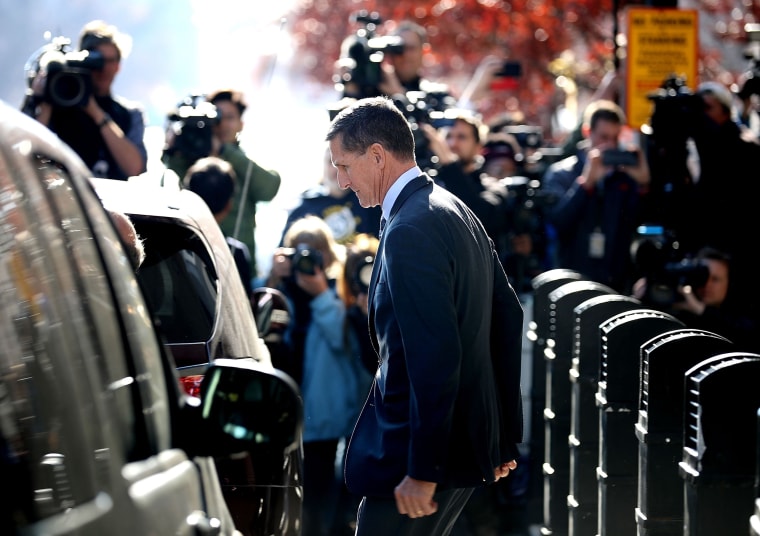At a sentencing hearing in late 2018, a federal judge delivered a harsh rebuke of Michael Flynn, President Donald Trump's first national security adviser, who had pleaded guilty to lying to the FBI.
"I can't make any guarantees, but I'm not hiding my disgust, my disdain for this criminal offense," U.S. District Judge Emmet Sullivan said.
At the time, Flynn had opted to postpone his sentencing, ostensibly to offer more assistance to the government and stave off a prison term. But now, more than a year later, he has a new defense team and a radical new strategy: to withdraw his guilty plea, arguing that he's a victim of an overzealous Justice Department operating in "bad faith."
The move, experts say, amounts to a Hail Mary pass that has the potential to place Flynn in greater legal peril.
"This is a risky maneuver," said Jeffrey Harris, a former federal prosecutor in New York, who was deputy associate attorney general during the administration of President Ronald Reagan.
"If Judge Sullivan were to allow him to do it — and I don't think he will — and he loses [at trial], he's toast," Harris said.
But Harris said that if Sullivan rejects the motion to withdraw the plea, Flynn's highly combative approach could end up landing him an even harsher sentence.
Referring to Sullivan, Harris added: "He shouldn't take this into account, but judges are human."

Other legal experts said the move could be a ploy by Flynn to stay in Trump's good graces and increase his chances of securing a presidential pardon.
"Attacking the Justice Department's investigation is consistent with the president's position," said Renato Mariotti, a former federal prosecutor in Illinois. "It certainly makes it more likely that he could obtain a pardon."
Flynn's case stretches back more than two years. He pleaded guilty in December 2017 to lying to the FBI about his conversations with Sergey Kislyak, then the Russian ambassador to the United States, in the weeks before Trump took office.
The allegations surfaced months earlier, prompting Flynn to resign as national security adviser after 24 days, the shortest tenure in the office's history.
Flynn, a retired three-star Army general, agreed to cooperate in special counsel Robert Mueller's investigation. He participated in 19 interviews with federal investigators and provided several documents, according to court papers.
Mueller's team later praised Flynn for having provided "substantial assistance" in the investigation into Russian election interference in 2016. It recommended a sentence of little or no jail time.
Download the NBC News app for breaking news and politics
But then came the sentencing hearing in December 2018. Sullivan admonished Flynn for having worked as an unregistered foreign agent for the Turkish government during the campaign. Flynn registered as a foreign agent only after he left his White House post, but he was not charged with a crime.
Sullivan also scolded Flynn for lying to the FBI.
"This is a very serious offense — a high-ranking senior official of the government making false statements to the Federal Bureau of Investigation while on the physical premises of the White House," Sullivan said.
The dramatic hearing ended with Flynn's taking up the judge on his offer to provide more time to offer further assistance.
But Flynn chose a different approach, instead. He dumped his veteran Washington lawyers and replaced them with a legal team led by Sidney Powell, a regular on Fox News who was a prominent critic of Mueller's investigation.
Flynn's new defense team immediately went on the attack and pushed for the case to be thrown out, accusing the government of having targeted Flynn for political purposes and having coerced him into making false statements.
"High-ranking FBI officials orchestrated an ambush-interview of the new president's National Security Advisor, not for the purpose of discovering any evidence of criminal activity — they already had tapes of all the relevant conversations about which they questioned Mr. Flynn — but for the purpose of trapping him into making statements they could allege as false," his attorneys said in court papers last year.
Prosecutors rejected the allegations and accused Flynn of pushing conspiracy theories. The judge sided with the prosecutors. The Justice Department reversed its position and recommended a prison sentence of up to six months, citing Flynn's failure to live up to his promise.
Late Tuesday, Flynn filed a motion to withdraw his guilty plea, recycling many of his previous allegations.
"The prosecution has shown abject bad faith in pure retaliation against Mr. Flynn since he retained new counsel," it says. "This can only be because with new, unconflicted counsel, Mr. Flynn refused to lie for the prosecution."
The judge could call a hearing before deciding whether to grant the motion. Three former federal prosecutors predicted that Sullivan will reject it, setting up another sentencing hearing.
"Defendants often try to withdraw their pleas, but in my experience, judges rarely grant them," Mariotti said. "If a defendant could just change their mind, it would just upset the whole process."
In an email message, Powell rejected the views of the outside legal experts.
"They don't know what I know about the conduct of the government in this case," she said. "You might want to read the exhibits, but they are only the tip of the iceberg. Stay tuned for more."
The experts said Flynn's move is risky for another reason: If the judge were to grant his motion, prosecutors could file a superseding indictment with additional charges.
"From any conventional analysis," Mariotti added, "this doesn't make sense, because he had a pretty good deal and he was going to have a recommendation for a sentence of almost nothing. He's potentially hurting himself."

